Don't Take The Bait: Fresh Scam Targeting Couples Uses ‘Cheating’ Spouse’s Name As Leverage

Scams delivered in various forms are more rampant than ever, with scammers preying on the vulnerabilities of individuals or exploiting their personal lives. In this scam-ridden world, a particularly troubling trend has emerged where scammers leverage the names of a "cheating" spouse to maximize financial gains.
How The Scam Works
This fresh-out-of-the-oven scam begins with a well-crafted email or message that appears customized for each target individual and claims to have evidence that your spouse is cheating on you.
What makes this scam so alarming is the emotional vulnerability it exploits. Relationships are a sensitive area for most people, and scammers know that a hint of infidelity can cause instant panic. This emotional pressure can cloud judgment, making individuals more likely to fall for the scam.
Researchers at Bitdefender Antispam Lab have also caught the campaign which, according to BleepingComputer, has sent husbands and wives who received this scam correspondence into a frenzy on Reddit.
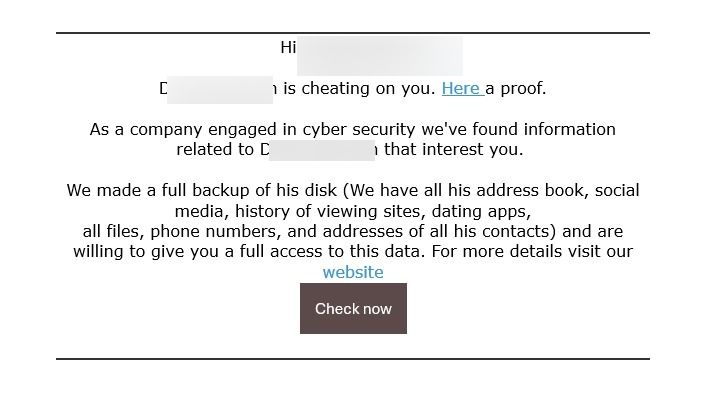
So, what’s the catch?
Scammers posing as relationship vigilantes disguise themselves as cybersecurity companies, luring victims with click-bait claims that they have irrefutable proof their spouse is cheating. Their goal is to manipulate emotions and pressure individuals into paying for fake "evidence."
Users who access the “proof” are directed to a recently created website prompting users to open an account.
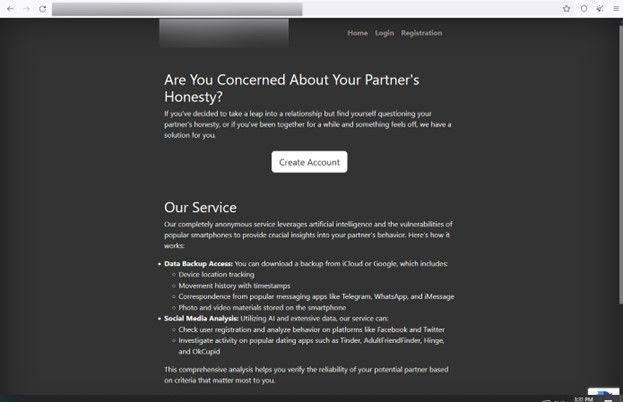
After creating the account, the user is prompted to click a button to generate the report on his spouse.
But how does this business have access to all the information on your spouse, you might ask. Well, one highly unethical option would be that the “business” is eavesdropping or somehow surveying your partner’s online activity – without permission, of course.
You’ve generated the report, what now?
Users are directed to another page showing a snippet of the type of data the service has gathered regarding your spouse. This includes backups of their activity on social networks, phone WhatsApp and much more.
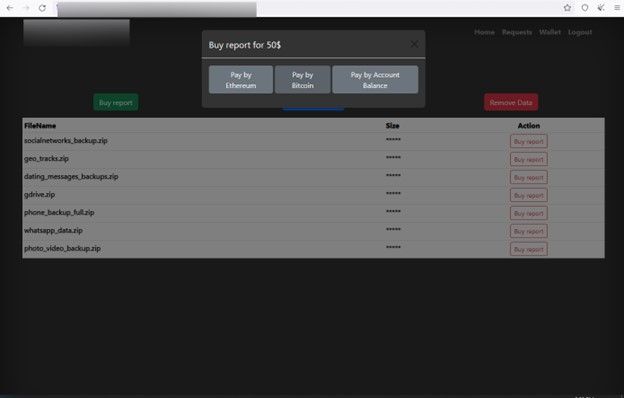
The “report” is purchasable and will allow you to visualize the “proof” via a Dropbox link.
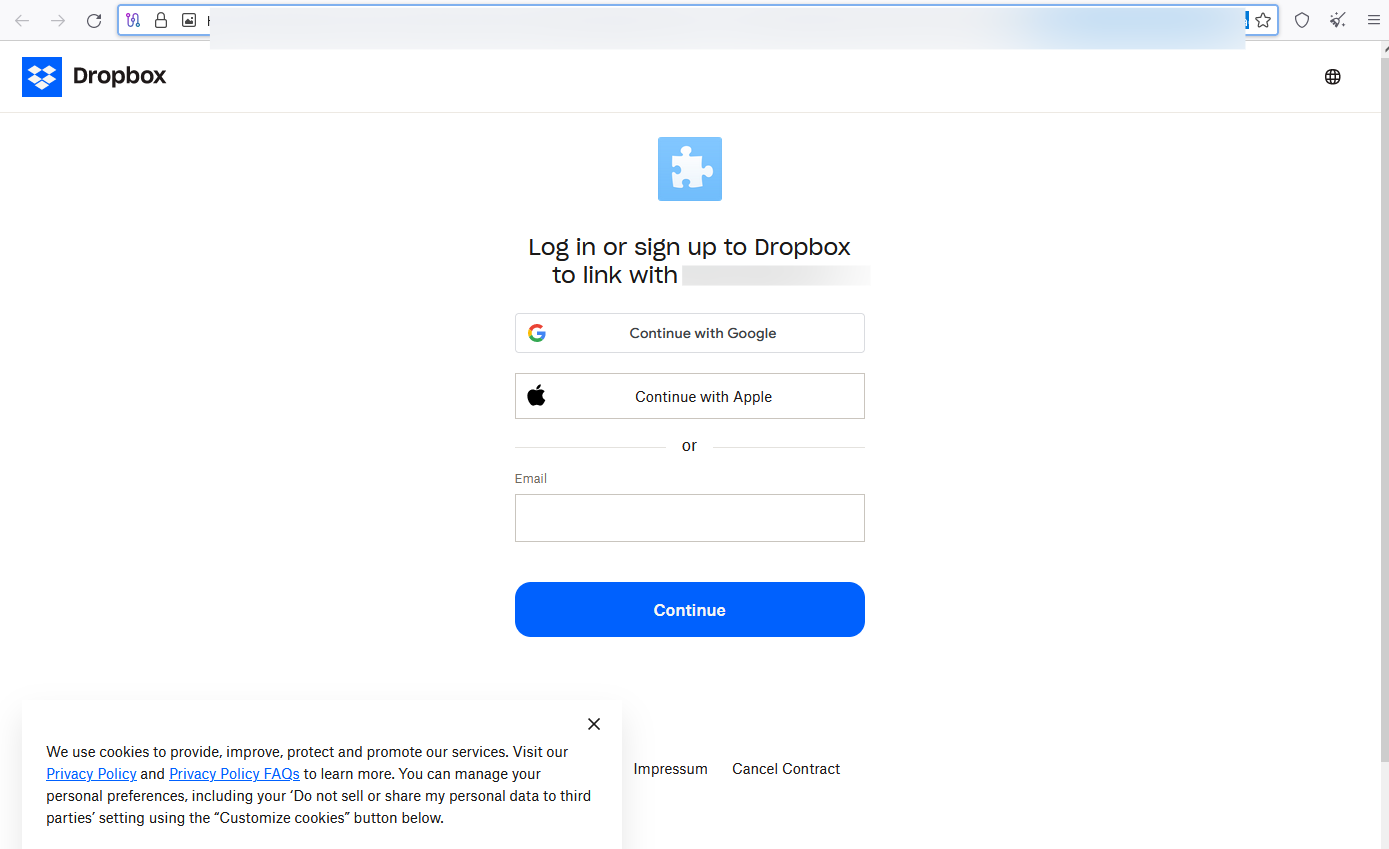
Payment can be made in BTC by scanning a QR code on the screen, as seen in the sample below:
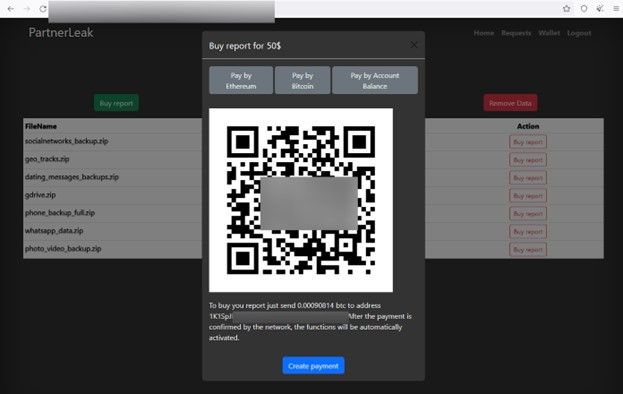
At the time of writing, the BTC address has not received any payments.
How Do Scammers Know Your Spouse’s Name?
The success of this scam largely depends on personalization, and scammers have several ways to obtain the name of you and your spouse, including:
- Data Breaches: Personal information is often leaked in data breaches, which may include your and your partner’s details.
Bleeping Computer reported that users on Reddit claimed to have only shared some of their information with a wedding planning website. The same victim said the email was accusing “a long deceased pet,” Mr. Wiggles of infidelity – info that was shared on the platform.
- Social Media: Social media profiles are treasure troves of personal information. If you’ve ever publicly posted about your relationship or tagged your spouse in photos, scammers can easily access their name and other details to make their messages seem more authentic.
- Phishing Attacks: In some cases, scammers may trick individuals into providing personal details through phishing emails or fake surveys. Once they have the information, they can use it to create a believable narrative.
Also read:
- Phishing Scams: How to Identify and Avoid Them
- Email Scams: How to Spot, Avoid and Report Them
- From fun to data loss: the dark side of Facebook quizzes
What to Do If You Receive a Scam Message
If you receive a message that says your spouse is cheating and it asks you for money to see the proof, you can breathe easy: it’s a scam.
- Stay calm: While it’s easy to panic when faced with such allegations, take a moment to compose yourself before responding in any way.
- Don’t respond or pay: Responding only confirms to the scammer that they’ve reached a live target. Paying will likely encourage further demands and scam correspondence. Remember, this is a scam designed to exploit your emotions.
- Verify the claims: If you are concerned about the allegations, hold an open and honest conversation with your spouse. Remember that scammers often create these accusations out of thin air and have no real evidence.
- Report the scam: Report the message to your local law enforcement, the FTC and the BBB. You can also forward the message to your email provider or messaging platform for further investigation.
Whenever you’re unsure about a link, message or proposal, check it with Scamio on WhatsApp, Facebook Messenger or a web browser for free! Copy/paste a text or link, describe the situation, and upload the image or the QR code you want to verify. Scamio will analyze the data and tell you if anyone is trying to scam you.
You can also help all of your friends and family members stay safe by sharing Scamio with them in France, Germany, Spain, Italy, Romania, Australia and the UK.
- Strengthen your privacy: Protect yourself from future scam attempts by enhancing your online privacy. Limit the amount of personal information you share on social media, and be cautious of emails or requests that ask you to provide sensitive data.
- Be mindful when sharing: The less personal information available online, the harder it is for scammers to create personalized attacks against you or your family members. Adjust your social media privacy settings and avoid sharing much personal information.
- Monitor for data breaches and leaks: Use tools that alert you if your personal information has been compromised in a data breach. Change passwords regularly, and enable two-factor authentication whenever possible to prevent unauthorized access.
Has your data been involved in a data breach or leak, giving scammers leverage to con you out of your hard-earned money? Find out with Bitdefender Digital Identity Protection which lets you immediately react to data breaches and other privacy threats.
- Stay Informed: Keep up to date with the latest scams and social engineering tactics. The more familiar you are with these frauds, the easier it will be to recognize a scam and avoid falling victim. Stay tuned to our blog for more insightful articles and guides to help you strengthen your security posture.
We would like to thank Viorel Zavoiu and Victor Vrabie for their help in putting this scam alert together.
tags
Author
Alina is a history buff passionate about cybersecurity and anything sci-fi, advocating Bitdefender technologies and solutions. She spends most of her time between her two feline friends and traveling.
View all postsRight now Top posts
How to Protect Your WhatsApp from Hackers and Scammers – 8 Key Settings and Best Practices
April 03, 2025
Outpacing Cyberthreats: Bitdefender Together with Scuderia Ferrari HP in 2025
March 12, 2025
Streamjacking Scams On YouTube Leverage CS2 Pro Player Championships to Defraud Gamers
February 20, 2025
How to Identify and Protect Yourself from Gaming Laptop Scams
February 11, 2025
FOLLOW US ON SOCIAL MEDIA
You might also like
Bookmarks







